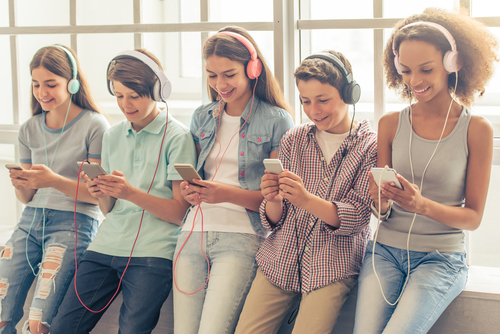We have known for years that excessive smartphone use is correlated with depression. However, until recently, the direction of causality was not known. Does excessive smartphone use cause people to become depressed? Or do people who are already depressed use their smartphones more often, leading to unhealthy dependence? A recent study published in the Journal of Adolescent Health lends support to the former hypothesis. This study, which followed adolescents between the ages of 17-20, found that dependence on smartphones at the start of the study predicted depression and loneliness three months later.

Although the mechanism of action here is not yet known, I have several thoughts about why and how excessive smartphone use can lead to depression. First, there’s the neurobiological effect of the smartphone use itself, which activates the Sympathetic Nervous System (“fight or flight” response), increases threat perception, and disrupts sleep. The Sympathetic Nervous System (SNS) is designed to protect us from danger by elevating heart rate, increasing levels of cortisol, and giving us the burst of energy we need to fight off a predator or flee from danger. The SNS is meant to be activated periodically, and for limited durations of time, when danger is present until danger passes. It is not meant to be activated every few seconds, all day long, each time we receive a notification on our iPhone. Over time, chronic SNS activation leads to depletion and depression. So does sleep deprivation.
Second, there’s social comparison. Adolescents are especially vulnerable to peer influence and frequently compare themselves to others to gain a sense of their social standing. Teens who spend excessive amounts of time scrolling through social media are likely to judge themselves unfavorably compared to others. It is all too easy for these teens to conclude that other people are prettier, thinner, happier, more successful, and having more fun than they are. Of course, most people only post pictures of themselves looking great, having fun, and doing interesting things, even if the majority of their lives are spent looking average and completing mundane tasks like homework and chores. Nonetheless, upward social comparisons such as these tend to lower self-regard, and poor self-esteem fuels depression.
Finally, excessive smartphone use has to replace other activities. There are only 24 hours in a day. If a teen is spending 15 hours per day on his smartphone, what is he NOT doing? Well, for starters, he is probably not getting a good night’s sleep. He is probably not eating balanced meals with his family, or if he is, he’s eating mindlessly while scrolling through social media rather than engaging in meaningful conversation with his parents and siblings. He is probably not present or engaged in class, and he is constantly distracted while doing homework (if he even does homework), which means he is not learning much nor reaching his academic potential. He is not getting much physical activity or time outdoors. He may not be participating in social activities (of the in-person variety), or clubs, or hobbies, or lessons, or volunteer work, or religious services. In other words, the habits and activities that have been proven to help us stay healthy and balanced and socially connected, that give us a sense of meaning and purpose in life, are notably absent in those who are dependent on smartphones.

In my clinical practice, I strongly encourage teens and young adults to limit their screen time. To promote restful sleep, which is essential for both physical and mental wellbeing, I recommend turning off all electronic devices one hour before bedtime and leaving them off overnight. It is remarkable how much better teenagers sleep, and how much better they feel during the day, when they turn off their phones and computers by 10:00 pm, relax before bedtime, and sleep a full 8 hours.
For individuals who experience body image distress or social anxiety, limiting use of social media can help reduce symptoms. This could involve unfollowing certain people who are especially triggering, or simply limiting the amount of time spent on social media to 30 minutes per day, for example. I will never forget the 15-year-old girl who suffered from Generalized Anxiety Disorder who, upon getting rid of SnapChat for a week, experienced complete relief from her symptoms! Unfortunately, she later returned to SnapChat and began experiencing more anxiety. Eventually, she figured out a way to set limits on her SnapChat use, which allowed her to remain connected with her friends while causing only a slight increase in anxiety. Personally, I would have gotten rid of SnapChat completely and permanently, but try telling that to a very social, strong-willed 15-year-old.
Like many technological advances that preceded it (the automobile, the television, the internet), the smartphone is a wonderful invention that has improved the quality and efficiency of our lives. But there is a fallout from many technological advances, particularly when they are used carelessly or in excess (e.g., global climate change, couch potatoes, cyber-bullying). The smartphone is no exception.

